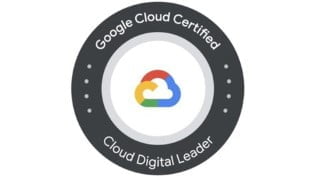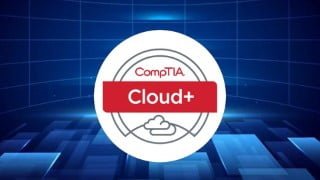Google Cloud Digital Leader Certification – For GCP Beginner
Prepare for the Google Cloud Digital Leader Certification with our comprehensive course. Learn key terms, compare cloud technologies, and explore Google Cloud solutions for data management and application development. Gain insights into AI and ML solutions, cloud security, and more. Perfect for developers, managers, and cloud enthusiasts.
What you’ll learn
- Define key terms such as cloud, cloud technology, data, and digital transformation
- Compare and contrast cloud technology and traditional or on-premises technology
- Identify common Google Cloud solutions for data management
- Explain the benefits of Google Cloud data products, including: Looker, BigQuery, Cloud Spanner, Cloud SQL, Cloud Storage
- Recognize the ways customers can use Google Cloud’s AI and ML solutions to create business value
- Differentiate between virtual machines, containers, and serverless computing within business use cases
- Explain the benefits of Google Kubernetes Engine, Anthos, and App Engine for application development
- Define fundamental cloud security terms, including privacy, availability, security, and control
‘Google Cloud Digital Leader Certification – For GCP Beginner’ course will help in preparing and making you ready for the Google Cloud Digital Leader Certification
The curriculum of the course is inspired from the official Cloud Digital Leader certification exam guide. Below are the important topics that this course covers,
Define key terms such as cloud, cloud technology, data, and digital transformation
Compare and contrast cloud technology and traditional or on-premises technology
Explain the benefits of modernizing infrastructure with cloud technology
Differentiate between hybrid and multicloud infrastructures
Differentiate between virtual machines, containers, and serverless computing within business use cases
Identify the Google Cloud solutions that help businesses modernize their infrastructure
Explain the benefits of Google Kubernetes Engine, Anthos, and App Engine for application development
Explain how application programming interfaces (APIs) can modernize legacy systems
Explain the benefits of Apigee
Recognize examples of structured and unstructured data
Apply appropriate business use cases for databases, data warehouses, and data lakes
Explain the benefits of Google Cloud data products, including: Looker, BigQuery, Cloud Spanner, Cloud SQL, Cloud Storage
Define artificial intelligence (AI) and machine learning (ML)
Recognize the ways customers can use Google Cloud’s AI and ML solutions to create business value
Describe financial governance in the cloud and Google Cloud’s recommended best practices for effective cloud cost management
Identify today’s top cybersecurity challenges and threats to data privacy
Concepts of DevOps, site reliability engineering (SRE)
Define monitoring, logging, and observability within the context of cloud operations
Identify the Google Cloud resource monitoring and maintenance tools
Who this course is for:
- For anyone who wishes to demonstrate their knowledge of cloud computing basics and how Google Cloud products and services can be used to achieve an organization’s goals
- Developers, QA, Managers, Architects, Business Analysts, Cloud enthusiasts
User Reviews
Be the first to review “Google Cloud Digital Leader Certification – For GCP Beginner”
You must be logged in to post a review.







There are no reviews yet.